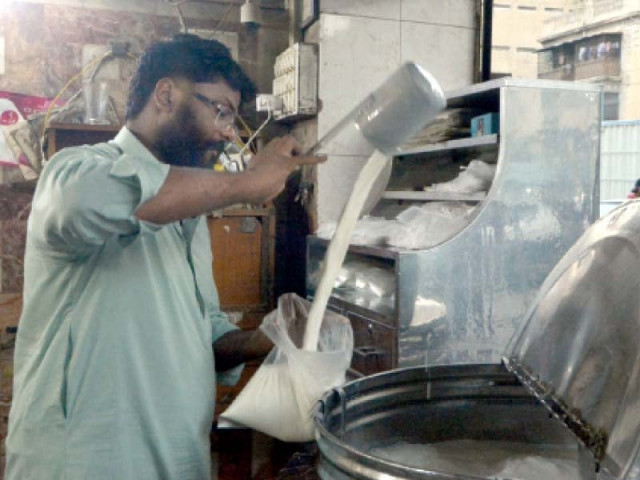Milk is fast becoming a luxury
Residents irked by government’s failure to implement price control mechanism

Albeit the current inflationary wave in the country is unprecedented, it seems that price control committees in Karachi have gone missing and left the city at the mercy of unabated price gouging by retailers.
Despite milk prices being fixed at Rs 105 per litre for dairy farmers, Rs 110 per litre for wholesalers, and Rs 120 per litre for retailers by the city’s Commissioner Office, back in December of last year, the ground reality is different.
As per a market survey carried out by the Express Tribune, the city’s milk sellers are retailing the commodity for Rs 200.
The upsurge in price is a problem because the city’s residents consume roughly 7 million litres of milk on a daily basis, as per Kaukab Iqbal, Chairman of the Consumers Association of Pakistan. Resultantly, residents like Asif Salehin, are upset that the government has done little to punish profiteering.
“Salaries have not increased but prices for every other good have gone up beyond measure. The government is enabling abuse of the citizens at the hands of price gougers,” Asif remarked, adding that purchasing power had been severely dented.
Another resident, Hina Shaikh, who is responsible for the grocery shopping at her place, said that she could not even budget anymore because every time she stepped out there was a new price for daily use commodities.
“The milk sellers increase prices whenever they want. I could afford to buy two litres of milk a few days ago and now I can barely get one litre of milk,” Hina lamented, adding that the government’s writ was nowhere to be seen when it came to enforcing price controls.
Similarly, Tabsum, a housewife who was out running errands, said that it was not just milk, retailers were looting people on nearly everything.
“Curd now costs Rs 300 per kg. Vegetables, meat, and eggs all cost an arm and a leg. It is becoming increasingly difficult to survive amidst such inflation.”
President of Dairy and Cattle Farmers Association, Shakir Gujjar, when asked about the blatant price gouging, said that it was not their fault prices had gone up.
“Due to the recent floods, a large number of cattle died. This has triggered a supply shortage. Hence, the increase in prices,” said Shakir.
He also informed that the rise in prices of livestock animals had added to the increase in dairy prices.
“Furthermore, fuel has become expensive, so we are left with little choice. Dairy farmers pay Rs 163 per litre of milk to the wholesalers. The wholesalers sell it for Rs 183 to the retailers, who then charge Rs 200 per litre,” Shakir explained.
In this price breakdown, there is barely a Rs 20 profit for all the people part of the supply chain, who also have bills to pay and mouths to feed, as per Shakir.
“Therefore, we have requested the Commissioner to fix the price at Rs 220. Our expenses need to be kept in mind as well,” the dairy association President asserted.
Haji Sher, who sells milk, concurring with Shakir, said that retailers like him were barely making any money at the current prices.
“After deducting all my expenses I make between Rs 5 to Rs 7 per litre, in profit. The high inflation and decline in purchasing power has adversely impacted us as well,” Haji said.
When asked if the ongoing price gouging would be punished, Spokesman for the Commissioner Karachi, said that instructions had been issued to all Deputy Commissioners and Assistant Commissioners to take action against those profiteering from milk.
“So far 42 people have been sent to jail for profiteering.100 shops have been sealed and fines amounting to Rs 7.8 million have been imposed,” the spokesman told The Express Tribune.



















COMMENTS
Comments are moderated and generally will be posted if they are on-topic and not abusive.
For more information, please see our Comments FAQ